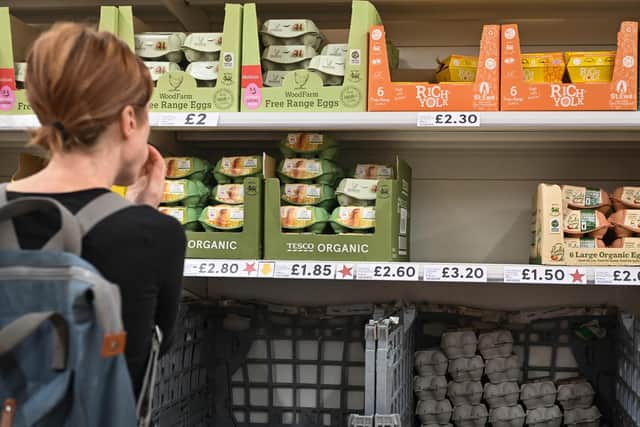Supermarket shop inflation falls to lowest level in over two years - but quarter still struggling
Marketing data and analytics company Kantar said inflation on groceries has fallen to 4.5 per cent, its lowest point since February 2022.
However, 23 per cent of British households still identify themselves as struggling financially, the same proportion that was recorded back in November 2023.
Advertisement
Hide AdAdvertisement
Hide AdThe figures come in tandem with a 4.6 per cent increase in take-home grocery sales for the four weeks to March 17, with an early Easter leading to an £88m increase in the sales of related treats such as chocolate eggs compared to the same point last year.


Sales of branded goods pushed ahead of own label this month. However, premium own-label lines saw growth of 16.1 per cent – the quickest rate in nearly three years
Ocado is the fastest growing retailer in Britain this month, while Morrisons has now been in consistent growth for over one year.
Fraser McKevitt, head of retail and consumer insight at Kantar, said: “With Easter on the horizon, consumers have been stocking up on classic seasonal treats, with a quarter of people picking up four or more items when buying chocolate eggs.
Advertisement
Hide AdAdvertisement
Hide Ad"This rises to 29 per cent for shoppers aged over 65, suggesting that many grandparents are planning to indulge their families this weekend.
"People in Wales and the north of England are among the biggest spenders, shelling out £14.18 and £13.84 on Easter eggs on average respectively in the past three months. Volume sales of hot cross buns are also up by 15 per cent versus last year.”
Mr McKevitt added: “Grocery inflation has come down significantly since hitting an eye-watering peak of 17 per cent in March 2023. However, despite this continued slowdown, many British households are still feeling the squeeze. 23 per cent identified themselves as struggling financially in our data – the same proportion as reported in November last year.”
Shoppers remain on the hunt for value and among those feeling most pressured, 78 per cent are actively buying cheaper groceries while 68 per cent are using promotions to help manage budgets. Retailers appear to be responding in kind, with the emphasis on discounts and price match schemes continuing this period. £605 million more was spent on deals this month than in March last year, while nearly one third of baskets across Tesco, Sainsbury’s and Asda collectively contained at least one price matched product.
Advertisement
Hide AdAdvertisement
Hide AdMr McKevitt said: “Premium own-label lines have been a big beneficiary of consumers trading down, growing by a whopping 16.1 per cent this month – the quickest rate we’ve seen in nearly three years. However, sales of branded goods pushed just ahead of own label overall, increasing sales by 6.1 per cent and 4.7 per cent respectively in the latest four weeks.”
Ocado was the fastest growing retailer this month, benefiting from a sustained voucher campaign which helped it attract customers.
Year-on-year sales at Britain’s two largest grocers, Tesco and Sainsbury’s, climbed by 5.8 per cent and 6.7 per cent respectively. Morrisons saw a 3.6 per cent increase in sales over the latest 12 weeks, marking more than one year of consistent growth for the retailer. Its share of spend stands at 8.7 per cent. Asda increased sales by 0.2 per cent and now holds 13.8 per cent of the market.
Comment Guidelines
National World encourages reader discussion on our stories. User feedback, insights and back-and-forth exchanges add a rich layer of context to reporting. Please review our Community Guidelines before commenting.